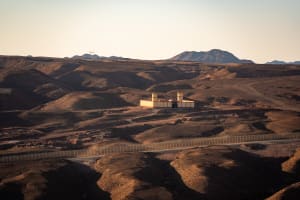Nine things to know about the Houthi's attack on Israel

In the pre-dawn hours Friday, Israel time, central Tel Aviv was attacked by an explosive drone fired by the Houthis, an Iranian proxy terrorist group in Yemen. Due to what the IDF says was human error, the drone was identified but not shot down by air defenses nor were air raid sirens activated. This is what you need to know.
The Distance
The drone has been identified as an Iranian-made Samad-3, modified to have an extended range as Tel Aviv is some 1,800 kilometers, more than 1100 miles, from Yemen. It reportedly flew at a low altitude for several hours via the Red Sea and over Egyptian territory, before striking Israel from the west over the Mediterranean Sea.
The Victims
A 50-year-old man was found dead in his apartment, apparently killed by shrapnel. Several were injured.
The Weapon
In order to reach Tel Aviv through this indirect route over Egypt, it’s believed that the Houthis modified the Iranian-made Samad-3 drone, decreasing the size of the explosive from 18 kilos to 10 kilos, and adding extra fuel. As much as the Houthis are an Iranian backed proxy terrorist organization, their use of Iranian weapons and its implications are under close scrutiny by Israel, by the west, and by the Iranian regime. How Israel is able to detect and respond to such attacks is something that all learn from.
The Target
The drone approached Israel from the west. Albeit flying low, it may have been meant to appear harmless, along the flight pattern of many approaching commercial aircraft. It struck central Tel Aviv near to where the US Embassy branch is located, but it is unclear whether that was a target. The day before, the US reportedly destroyed other drones, however the IDF reported that these are separate incidents. The Houthis have declared that this is a “new phase” in their attacks against Israel.
Who are the Houthis?
The Iran-backed Houthis took over southern Yemen and its capital, Sanaa, from its Sunni government in 2014. They control large parts of the country and remain in conflict with the Saudi-backed Yemeni government. Along with Hamas, Hezbollah, and other Iranian-backed terror groups, they are part of the “axis of resistance” against Israel. Since November 2023, they have fired hundreds of drones and missiles at Israel, and attacked ships along the southern tip of the Arabian peninsula, and Red Sea, disrupting global shipping even through Egypt’s Suez Canal.
Israel’s Response
Due to the attack, the Israeli cabinet ministers gathered in an emergency session on, Saturday, Shabbat. Typically, public business and government activities do not take place on the Sabbath, indicating that this was a seen as a serious military situation that required an immediate response, and that further Israeli restraint was not an option.
IDF Spokesman Daniel Hagari noted this was a particularly complicated mission, using F-15, F-35, and other aircraft including refueling planes to carry out ten airstrikes against Houthi military targets around Yemen’s Hodeidah port, used to transport Iranian weapons.
Other than the immediacy of the response, Israel’s targeting military facilities 1,800 kilometers (1,100 miles) away, is a signal to Iran. Tehran is also about 1,800 kilometers from Israel. Some might consider this a test run for an Israeli attack on Iranian nuclear and other military facilities. In addition to the distance, Israel’s response indicated that it has significant intelligence capabilities, also a warning to Iran, Hezbollah and others.
After the Israeli response, Defense Minister Yoav Gallant said, "The fire that is currently burning in Hodeidah, is seen across the Middle East and the significance is clear. The Houthis attacked us over 200 times. The first time that they harmed an Israeli citizen, we struck them. And we will do this in any place where it may be required."
What’s Next?
Despite Israel’s attack, the IDF issued no new civilian security instructions indicating a higher state of alert. Prime Minister Netanyahu is still planning to embark on his trip to the United States to meet President Biden, and address a joint session of Congress.
After the attack near the US Embassy office, Netanyahu is expected to double down on highlighting the Islamic regime’s increasing efforts to destroy Israel, its terrorist tentacles throughout the Middle East, and apparently accelerating nuclear weapons drive about which Secretary of State Blinken said Iran could be just 1-2 weeks from having enough nuclear material for a bomb.
Three months after Iran’s own unprecedented missile and drone attack, Netanyahu’s message is all the more relevant. Saturday night he said, “Anyone who wishes to see a stable and safe Middle East needs to stand against Iran’s axis of evil, and support Israel’s fight against Iran and its proxies – in Yemen, in Gaza, in Lebanon, everywhere.”
Israel informed the US and other regional governments in advance of its strike against the Houthi targets. While it does not seem that any immediate threats of escalation from the Houthis or others are on the horizon, there is the potential that the direct retaliation against the Houthis could trigger still further response from Yemen or other Iranian proxies, especially if Netanyahu is out of the country on an important visit to Washington.
Arab Allies
In addition to notifying Washington in advance, there are indications that Arab countries, were also informed, and that even the Saudis who are also in conflict with, and have been attacked by, the Houthis, could have assisted in the use of their airspace or with refueling. Surely, the Saudis and the Egyptians whose airspace was breached, were at least silently celebrating if not indirectly supporting Israel’s attack.
Current Events or Prophesy
“So said the Lord: For three sins of Edom, yea for four, I will not return them: For pursuing their brother with a sword, and they destroyed their mercy and grasped forever their anger and kept their fury forever. And I will send fire into Teman (Yemen), and it shall consume the palaces of Bozrah.” (Amos 1:11-12)

Jonathan Feldstein was born and educated in the U.S. and immigrated to Israel in 2004. He is married and the father of six. Throughout his life and career, he has become a respected bridge between Jews and Christians and serves as president of the Genesis 123 Foundation. He writes regularly on major Christian websites about Israel and shares experiences of living as an Orthodox Jew in Israel. He is host of the popular Inspiration from Zion podcast. He can be reached at [email protected].













